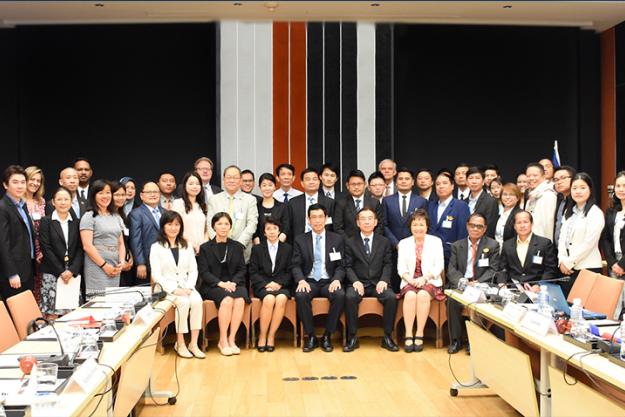
Participants at a Sub-regional Stakeholders Forum for Advancing CWC National Implementation and Regional Cooperation in Southeast Asia in Bangkok
BANGKOK, Thailand — 3 May 2018 — Eleven States Parties from Asia gathered to discuss the national implementation of the Chemical Weapons Convention (CWC) during the Sub-regional Stakeholders Forum for Advancing CWC National Implementation and Regional Cooperation in Southeast Asia in Bangkok, Thailand on 24-26 April 2018.
Over 40 participants from nine Member States of the Association of Southeast Asian Nations (ASEAN) and two dialogue partner-States, Japan and Republic of Korea, used the opportunity to discuss regional cooperation for enhancing national implementation. Topics covered included the promotion of economic developments while fulfilling CWC obligations and the role national legislation plays in responding to emerging threats to the Convention.
In his opening remarks, Mr. Mongkol Pruekwatana, Director General of the Department of Industrial Works, Ministry of Industry, the Royal Government of Thailand, highlighted the importance of the sub-regional meeting for exchanging experience and best practices. He noted that trade, economic development, and peace and security are essential for national prosperity, and that these areas would be reinforced by discussing cross-border issues and identifying common approaches to strengthening CWC implementation at a regional level.
During discussions, participants proposed specific recommendations on how regional platforms could be used, responsible entities, and timeframes for next-steps. Participants then compiled these recommendations and pledged to take them further immediately upon return to their capitals.
Participants shared the view that regional platforms such as ASEAN and the ASEAN Regional Forum should be more vigorously capitalised on to enhance CWC national implementation.
Participants from the ASEAN States comprised of the CWC National Authority, chemical industry, and the Government entity responsible for law enforcement and security matters. Representatives from the UNSCR 1540 Committee, International Council of Chemical Associations (ICCA) and the Pacific Forum – Center for Strategic and International Studies, also attended and contributed to discussions.
Background
According the European Chemical Industry Council, chemical production in Asia outpaces other regions in the World. Twelve of the thirty biggest chemical producers are in Asia, sharing 57% of the world market.
In November 2017, the East Asia Summit Leaders’ Statement on Chemical Weapons was adopted at the 12th Summit in Manila, the Philippines, and placed a special emphasis on cooperation among States to fulfil CWC obligations.
As of August 2017, out of 192 States Parties to the CWC, 153 States Parties (78%) had reported the adoption of national implementing legislation to the Secretariat. Out of 55 States Parties in Asia, 31 States Parties (58%) have adopted legislation covering all initial measures, while nine States Parties (17%) have adopted legislation that covers some of the initial measures, and 13 States Parties (25%) have yet to adopt implementing legislation.
As the implementing body for the Chemical Weapons Convention, the OPCW oversees the global endeavour to permanently eliminate chemical weapons. Since the Convention’s entry into force in 1997 – with its 192 States Parties – it is the most successful disarmament treaty eliminating an entire class of weapons of mass destruction.
Over 96 per cent of all chemical weapon stockpiles declared by possessor States have been destroyed under OPCW verification. For its extensive efforts in eliminating chemical weapons, the OPCW received the 2013 Nobel Prize for Peace.
